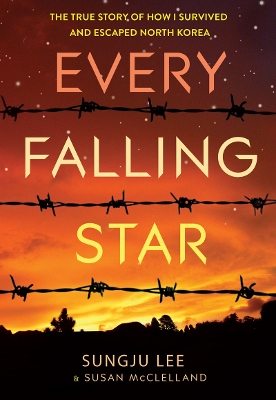I received this book for free from NetGalley, courtesy of ABRAMS Kids, in exchange for an honest review. This does not affect my opinion of the book or the content of my review.
Every Falling Star is an interesting read in many regards. It’s a memoir written by Sungju Lee, a North Korean defector, with help from Susan Elizabeth McClelland. The novel is about Sungju’s childhood in North Korea from when he was roughly eleven to sixteen years old and covers what he had to go through in order to survive and how he escaped the country.
Every Falling Star tells a deep and powerful story, but some of the events that happen feel like they push the boundaries of reality. It contains many aspects of dystopian novels and has more similarities with The Hunger Games than with The Life of George Washington. Still, the novel left me with the distinct impression that while some events may have been exaggerated (it is told from a child’s perspective, after all), they did indeed happen.
I really like the way Every Falling Star is told and how it is written to target children and young adults. Every Falling Star was a big eye opener for me. I think for many people, North Korea is shrouded in mystery. Every Falling Star provides some light on the manner and shatters many misconceptions I had about North Korea and its people, starting with the fact that all of its citizens are happy or at least satisfied with their government. As such, I feel like this book is a must read for people of all ages as it has the unique power to educate a population and to fight ignorance.
Another highlight of Every Falling Star is the characters and the relationships that develop. I really enjoyed reading about how seven boys with different personalities and backstories started a working relationship that over time, evolved into a brotherhood. The story managed to captivate me in a way that allowed me to connect and empathize with characters who are very different from myself.
While I thought the writing is nice and flowy for the majority of the memoir, it does feel choppy every once in awhile. At times, it felt too childish and other times too mature. The novel also has a lot of dialogue, which I am impartial to, but may contribute to the disjointed feeling. That being said, I did find many golden quotes within the pages.
The pacing is also a little off. I get that some years might have been more eventful than others, but while the majority of the story spans four years, I felt like a significant amount of the novel is dedicated to only one or two, regardless if that actually was the case or not. As a result, I had a hard time keeping track of time and of Sungju’s age.
In conclusion, Every Falling Star is an inspiring tale of friendship, hope, and perseverance. It’s a must read as it has the power to open the eyes of many readers about life in North Korea. While it does contain some choppy writing and awkward pacing, it is a written in a beautiful manner and contains characters that are easy to emphasize with. I would highly recommend this memoir to fans of The Book Thief and Persepolis.
For more reviews like this one and other content, visit Paging Serenity.
